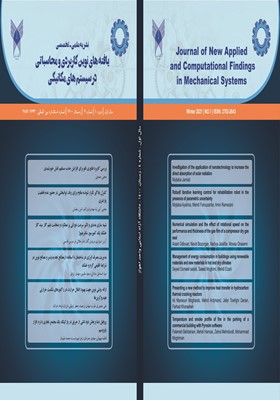کنترل یادگیر تکرار شونده مقاوم برای ربات توانبخشی در حضور عدم قطعیت پارامتری
محورهای موضوعی : یافته های نوین کاربردی و محاسباتی در سیستم های مکانیکی
مجتبی آیتی نیا
1
,
مهدی فروزانفر
2
![]() ,
امین رمضانی
3
,
امین رمضانی
3
1 - گروه مهندسی برق، واحد اهواز، دانشگاه آزاد اسلامی، اهواز، ایران
2 - گروه مهندسی برق، واحد اهواز، دانشگاه آزاد اسلامی، اهواز، ایران
3 - گروه کنترل، دانشکده مهندسی برق و کامپیوتر، دانشگاه تربیت مدرس، تهران، ایران
کلید واژه: بهره یادگیری ثابت, کنترل یادگیر تکرار شونده (ILC), عدم قطعیت پارامتری, ربات توانبخشی,
چکیده مقاله :
در این مقاله، همگرائی مقاوم کنترل یادگیر تکرار شونده (ILC) در ربات توانبخشی خطی دارای عدم قطعیت پارامتری، بدست آمده است. امروزه رباتهای توانبخشی وظیفه مهمی را در کمک به فیزیوتراپها در ترمیم آسیبهای حرکتی بر عهده دارند. از آن جهت که عدم قطعیت در رباتهای توانبخشی در عمل با تکرار تغییر میکنند، حذف اثر عدم قطعیت پارامتری متغیر با تکرار امری بسیار ضروری است. همچنین عدم قطعیت پارامتری در ماتریسهای ورودی و خروجی مدل یک ربات توانبخشی، تاثیر مستقیمی بر همگرائی الگوریتم ILC داشته و یک تاثیر کوچک در هر یک از این ماتریسها، ممکن است به واگرائی الگوریتم منجر شود. در این مقاله، ابتدا قانون الگوریتم ILC بدون حضور عدم قطعیت بدست آمده و سپس همگرائی مقاوم این الگوریتم با یک بهره یادگیری ثابت در حضور عدم قطعیت پارامتری، اثبات شده است. در پایان صحتسنجی نتایج بدست آمده روی یک مدل ربات توانبخشی مورد تحلیل و ارزیابی قرار گرفته است.
In this paper, the robust convergence of iterative learning control (ILC) in a linear rehabilitation robot with parametric uncertainty is obtained. Today, rehabilitation robots have an essential role in assisting physiotherapists in repairing muscle injuries. Since the uncertainties in rehabilitation robots change with practice in iteration, it is crucial to eliminate the effect of variable parametric uncertainty with iteration. Also, parametric uncertainty in the input and output matrices of a rehabilitation robot model directly affects the convergence of the ILC algorithm, and a small effect on each of these matrices may lead to algorithm divergence. In this paper, first, the law of the ILC algorithm without uncertainty is obtained. Then the robust convergence of this algorithm with a fixed learning gain in the presence of parametric uncertainty is proved. Finally, validation of the results obtained on a rehabilitation robot model is analyzed and evaluated.
[1] Burgar, C. G., Lum, P. S., Shor, P. C., and Van der Loos, H. M. (2000). Development of robots for rehabilitation therapy: The Palo Alto VA/Stanford experience. Journal of rehabilitation research and development, 37(6),pp 663-674.
[2] Krebs, H. I., Hogan, N., Aisen, M. L., and Volpe, B. T. (1998). Robot-aided neurorehabilitation. IEEE transactions on rehabilitation engineering, 6(1),pp 75-87.
[3] Khoshdel, V., Akbarzadeh, A., and Moeenfard, H. (2015). Variable impedance control for rehabilitation robot using interval type-2 fuzzy logic. International Journal of Robotics, Theory and Applications, 4(3),pp 46-54.
[4] Berezny, N. J. (2019). Design and Implementation of a Novel Rehabilitation Robot for Acute Stroke Patients. Carleton University.
[5] Xu, G., Song, A., and Li, H. (2011). Adaptive impedance control for upper-limb rehabilitation robot using evolutionary dynamic recurrent fuzzy neural network. Journal of Intelligent & Robotic Systems, 62(3),pp 501-525.
[6] Ju, M.-S., Lin, C.-C., Lin, D.-H., Hwang, I.-S., and Chen, S.-M. (2005). A rehabilitation robot with force-position hybrid fuzzy controller: hybrid fuzzy control of rehabilitation robot. IEEE transactions on neural systems and rehabilitation engineering, 13(3),pp 349-358.
[7] Geng, Y. and Ruan, X. (2015). Quasi-Newton-type optimized iterative learning control for discrete linear time invariant systems. Control Theory and Technology, 13(3),pp 256-265.
[8] Van De Wijdeven, J., Donkers, M., and Bosgra, O. (2011). Iterative learning control for uncertain systems: Noncausal finite time interval robust control design. International Journal of Robust and Nonlinear Control, 21(14),pp 1645-1666.
[9] Xu, J., Sun, M., and Yu, L. (2005). LMI-based robust iterative learning controller design for discrete linear uncertain systems. Journal of Control Theory and Applications, 3(3),pp 259-265.
[10] Meng, D. and Moore, K. L. (2014). On robust iterative learning control against iteration-varying uncertain plant parameters. Paper presented at the 2014 American Control Conference.
[11] Meng, D. and Moore, K. L. (2016). Robust iterative learning control for nonrepetitive uncertain systems. IEEE Transactions on Automatic Control, 62(2),pp 907-913.
[12] Emelianova, J., Pakshin, P., and Emelianov, M. (2019). Observer Based Iterative Learning Control of Uncertain Plant. IFAC-PapersOnLine, 52(29),pp 298-303.
[13] Zhu, X., Soh, Y. C., and Xie, L. (2002). Design and analysis of discrete-time robust Kalman filters. Automatica, 38(6),pp 1069-1077.
[14] Zhu, M., Ye, L., and Ma, X. (2020). Estimation-based quadratic iterative learning control for trajectory tracking of robotic manipulator with uncertain parameters. IEEE Access, 8,pp 43122-43133.
[15] Ahn, H.-S., Chen, Y., and Moore, K. L. (2007). Iterative learning control: Brief survey and categorization. IEEE Transactions on Systems, Man, and Cybernetics, Part C (Applications and Reviews), 37(6),pp 1099-1121.
[16] Moore, K. L., Chen, Y., and Bahl, V. (2005). Monotonically convergent iterative learning control for linear discrete-time systems. Automatica, 41(9),pp 1529-1537.
[17] Noueili, L., Chagra, W., and Ksouri, M. (2015). Optimal iterative learning control for square MIMO linear systems. Paper presented at the 2015 7th International Conference on Modelling, Identification and Control (ICMIC).


